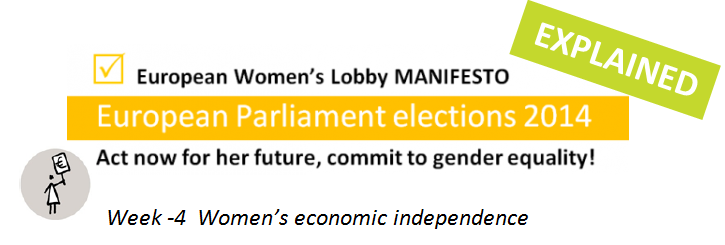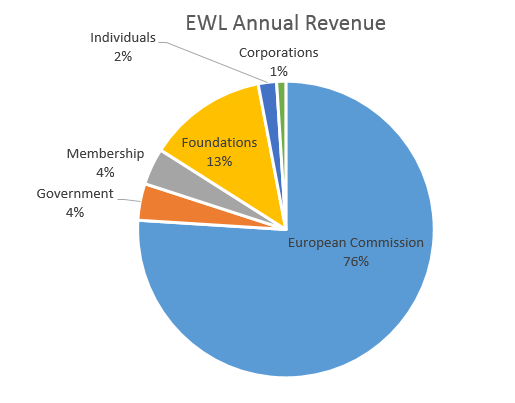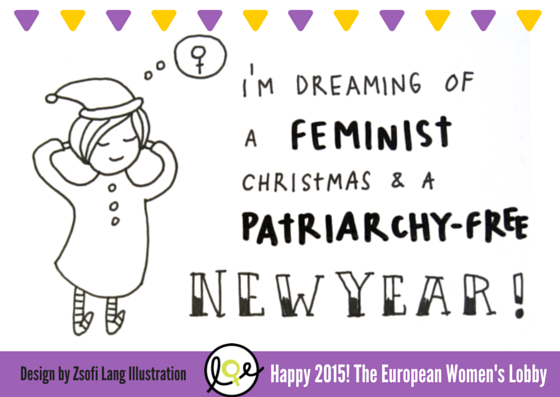[Brussels, 26 April 2014] 4 weeks before the European elections, the European Women’s Lobby explains, week after week, the demands of its Manifesto “Act now for her future, commit to gender equality!“. The fifth demand of the European Women’s Lobby (EWL), the largest umbrella organisation of women’s associations in the European Union, is women’s economic independence, the key to all freedoms.
Women’s economic independence is of crucial importance to enable women to make real choices in their lives on an equal footing with men and in order to achieve effective gender equality. Women’s real and full economic independence is not yet a reality in any of the EU member states. Persistent gender gaps in pay, poverty and pensions show that women’s economic independence is a long way to being achieved and that the vast majority of women remain in a dependency status. Statistics show that women on average continue to earn 16 % less than men within the EU. In the absence of decisive action, forecasts predict that it will take 70 years to close the gender pay gap!
Yet this is an indicator that does not take into account the unequal share of care responsibilities between women and men, the disproportionate impact that austerity measures are having on women and the persisting stereotypes about gender roles that compromise women’s economic independence throughout their lives. In figures, women’s employment rate – 63% – is nowhere close to the EU target of 75%, and work patterns continue to reflect traditional gender roles as women are four times more likely than men to work part-time.
Therefore it is urgent to promote women’s quality employment by effectively enforcing and strengthening EU equality legislation. For decades, the EU was at the forefront of ensuring women’s equal access to employment, training and promotion, equal treatment to occupational social security, recourse to combat sexual harassment in the work place, and protection from dismissal while pregnant and on return to work. All of these Directives have been transposed at national level but they need to be closely monitored and effectively enforced to ensure that women can exercise their rights on the labour-market. The EWL calls on the future European Parliament to pursue the adopted Resolution of 2012 (European Parliament resolution of 24 May 2012 with recommendations to the Commission on application of the principle of equal pay for male and female workers for equal work or work of equal value) calling for more stringent action to close the gender pay gap.
Despite existing legislation on the protection of pregnant workers, women continue to be discriminated on the grounds of pregnancy/childbirth. The perception of women as potential pregnant workers could be one of reasons why younger women, in comparison to younger men, find it harder to enter the labour-market. The EWL calls on the future European Parliament (EP) to maintain the position of the previous EP on the revision of the Pregnant Workers’ Directive adopted in 2010 as this is a major step towards equality between women and men, social progress and economic sustainability.
The EWL calls on the European Parliament to pursue negotiations with the Council in view of adopting the revised Directive which will subsequently send a strong message to all – Europe is committed to women’s equal access to the labour-market and to provide paternity leave, as to date there is no EU Directive on paternity leave. Securing pregnant workers’ rights is critical as it is very often at this moment in their lives that the gender pay gap kicks in, as women’s working patterns become shaped by their child birth history and subsequent caring responsibilities, which leave life-long ‘scars’. The gender pension gap, a staggering 39%, double that of the pay gap, mirrors the accumulation of gender inequalities throughout women’s lives. Furthermore, more than a third of older women have no pensions at all in some Member States.
The EU Member States are tackling the economic crisis with austerity measures and drastic cuts in public spending, affecting negatively gender equality since women rely more on the public sector as employees and beneficiaries of public services. Yet, while women are remaining in the labour market, it comes at a high cost as they are considered as ‘second earners’ in dual earner households, which impede upon their own economic independence and maintain them in a dependency status. Cuts in child care and other services run the risk of transferring these back to women, compromising their own economic independence. The EWL calls on EU decision-makers to guarantee women’s economic independence through individual rights to social protection and taxation. Furthermore, the EWL calls to move beyond the household unit measure which not only assumes that gender equality is present within households but prevents decisive action on guaranteeing individual rights to women to monitor and ensure progress towards women’s economic independence.
According to the Gender Equality Index published by the EIGE Network women on average are more likely than men to be at risk of poverty. Over a quarter of women in the EU are poor (26%). 22% of older women are poor in comparison to 16% of older men and over one third of single parents – primarily women – are poor. Around 9% of people employed experience in-work poverty which shows that having any kind of job is not enough. Therefore it is vital to make investments in quality and sustainable employment, a strategic plan to combat poverty and gender impact assessments to ascertain the impact of policies, including macro-economic policies, to make visible and address the feminisation of poverty in Europe. The EWL calls on the EU decision-makers and Member States to address women’s poverty including in-work poverty, the gender pay and pension gaps and to set targets to decisively reduce the feminisation of poverty in Europe.
The European Semester process which is the driving force for the achievement of the EU 2020 goals (75% employment rate for women and men, lift at least 20 million people out of poverty, reduce the school drop-out rate by 10%, increase in energy efficiency by 20%) lacks transparency. Currently, the European Parliament is not part of the decision-making processes of the EU Semester and the lack of stakeholder involvement in the process is a serious concern about the democratic legitimacy of the European Semester itself. Civil society organisations including women’s organisations are calling for a partnership based on a meaningful dialogue to actively contribute to ensure that in the EU semester delivers the Europe 2020 goals. The EWL calls for the EU Commission to democratise the EU semester process through the participation of the European Parliament and civil society, including women’s organisations.
This snapshot shows that there are still many steps to take before women’s economic independence becomes a reality. Apparent gender gaps persist in earnings, working patterns and expectations with regards to women’s role both in paid and unpaid work all of which impact on women’s economic independence. The EWL calls on the European Parliament, the European Commission to commit to real and effective equality between women and men, in all spheres of public and private life, across the EU.
Investing in gender equality to achieve women’s economic independence will make her future a better world for us all.
Read here EWL Manifesto.
#EuropeanWomensVoice #EP2014
Women and girls are half of Europe’s population, and are entitled to the same rights as men and boys. Achieving substantive equality between women and men, promoting women’s rights and empowering women should be a priority of the European Union and its Member States. Gender equality is an essential part of democracy, social justice, human rights and dignity. Our Manifesto “Act now for her future, commit to gender equality!” develops our vision of a Europe committed to the realization of equality between women and men. We urge all candidates to the European elections to endorse it!
[Data taken from European Commission, Report on Progress on equality between women and men in 2013, Staff Working Document, Brussels, 14.4.2014 SWD(2014) 142 final]



